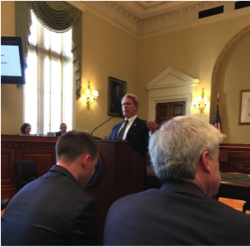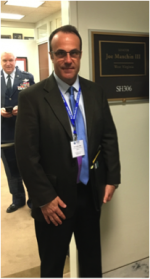By Eric E. Kelley, Ph.D., West Virginia University
 This spring, SfRBM joined FASEB in Washington, D.C., in a major push for increased funding for the NIH, NSF, USDA and VA. Eric Kelley represented SfRBM as both Science Policy Officer and as a member of the FASEB Board of Directors. The focus of this year’s presence on Capitol Hill was 3-fold:
This spring, SfRBM joined FASEB in Washington, D.C., in a major push for increased funding for the NIH, NSF, USDA and VA. Eric Kelley represented SfRBM as both Science Policy Officer and as a member of the FASEB Board of Directors. The focus of this year’s presence on Capitol Hill was 3-fold:
1) Maintain positive pressure on recent success in obtaining additional funding for scientific research
2) Push Senators and Representatives to establish a budget for 2017 and 2018 to avoid a continued resolution (CR) process whereby funding for NIH and allied partners would remain stagnant
3) Educate congressional members on the impact of our research pursuits
The latter was addressed directly by holding a briefing in the Senate where FASEB President Hudson Freeze gave a compelling presentation on the influence of NIH dollars on rare disease outcomes. This briefing was well-attended by congressional members as well as their healthcare staffers and was seen as an event that would be welcomed again in future visits. The former two directives were accomplished by meeting with staffers in offices whereby individuals were paired to ensure they covered congressional members from their home region. Key offices, however, were those occupied by both House and Senate Appropriations Committee members. As such, Eric Kelley met with Senators Joe Manchin (D-WV) and Shelly Moore Capito (R-WV), who are both standing members of the Senate Appropriations Committee.
 Overall, responses were positive and receptive while recognizing that we are indeed falling behind in a manner that is critically affecting our capacity to maintain productive research pursuits as well as train the next generation of scientists. One has to look no further than NIH pay-lines and/or NIH spending power to find evidence to support the critical state of the research enterprise. Due to sequestration and annual inflation the spending power of the NIH grant dollar is currently approaching levels equivalent to those realized in 2004. Without the efforts of Senator Roy Blunt (R-MO) and Representative Tom Cole (R-OK), who rallied bipartisan support for over 4 billion dollars in additional funds for the NIH in 2016 and 2017, our spending power would be approaching 2001 levels. We very much appreciate these efforts to arrest the free fall in the funding crisis while we also recognize this as a time to double our efforts to ensure positive momentum. To this end, FASEB is recognizing the importance to reaching out to congressional members from districts that do not contain major research institutions and/or allied tertiary medical centers. The goal is to educate these members on the importance of federally-funded biomedical research and the indirect impact these dollars will have on their constituents. You will be hearing more about this program in the next several months as we solicit your support.
Overall, responses were positive and receptive while recognizing that we are indeed falling behind in a manner that is critically affecting our capacity to maintain productive research pursuits as well as train the next generation of scientists. One has to look no further than NIH pay-lines and/or NIH spending power to find evidence to support the critical state of the research enterprise. Due to sequestration and annual inflation the spending power of the NIH grant dollar is currently approaching levels equivalent to those realized in 2004. Without the efforts of Senator Roy Blunt (R-MO) and Representative Tom Cole (R-OK), who rallied bipartisan support for over 4 billion dollars in additional funds for the NIH in 2016 and 2017, our spending power would be approaching 2001 levels. We very much appreciate these efforts to arrest the free fall in the funding crisis while we also recognize this as a time to double our efforts to ensure positive momentum. To this end, FASEB is recognizing the importance to reaching out to congressional members from districts that do not contain major research institutions and/or allied tertiary medical centers. The goal is to educate these members on the importance of federally-funded biomedical research and the indirect impact these dollars will have on their constituents. You will be hearing more about this program in the next several months as we solicit your support.